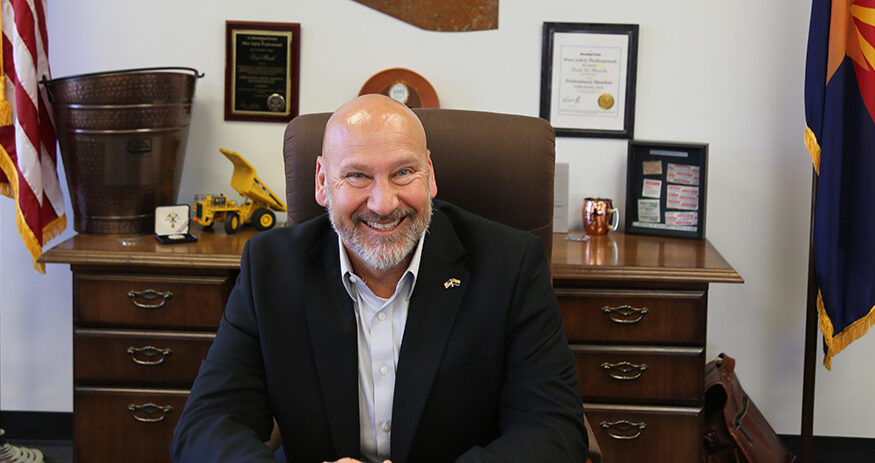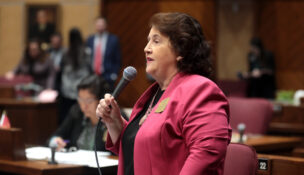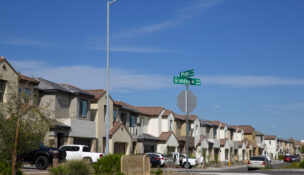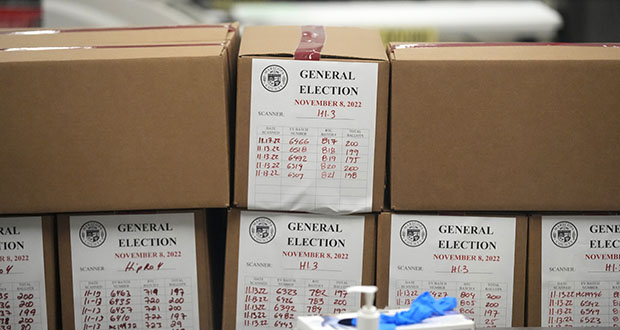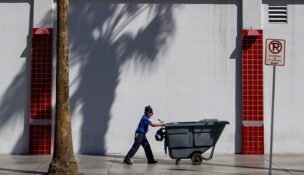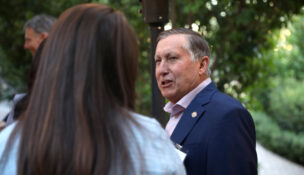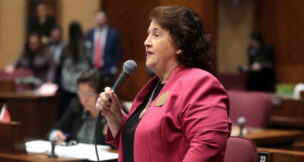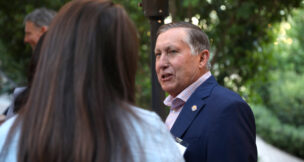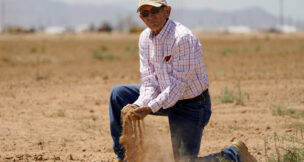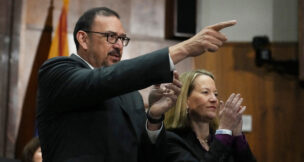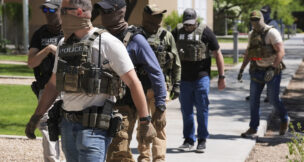Paul Marsh: Keeping mines safe and rocks cool
Reagan Priest Arizona Capitol Times//February 23, 2025//
Paul Marsh: Keeping mines safe and rocks cool
Reagan Priest Arizona Capitol Times//February 23, 2025//
Paul Marsh is the only elected state mine inspector in the United States and has served since 2021. He told the Arizona Capitol Times that he is a reluctant politician who is passionate about making mining as safe as possible and educating Arizonans about its impact on the state.
How did you get into the mining industry?
[I am] a Marine Corps veteran, ran heavy equipment in the Marine Corps. When I got out, I was looking for work and started working at a small sand and gravel mine as an equipment operator/laborer. I drove ready mix trucks. I still have my CDL today. I got an opportunity to go into dispatch, which afforded me time to go to school, and I took a 300-hour OSHA course. I didn’t realize it at the time, but it opened the door to get into mine safety. In 2003 there was an opening, just one of those right place, right time things. So as green as you can be, a little bit of schooling, no real world knowledge, I was promoted to a safety manager for a company here in Phoenix. From there, I just kept working my way up. So I went from that company to another company, built my safety resume, went to another company where I was safety manager for 26 sites, and then I was promoted to director of safety. From there, I was offered the operations manager role at CalPortland. My last role as operations manager gave me a different view of the world. Instead of looking at it through a safety lens, you looked at it through operations and those two things usually don’t commingle too well together. I think it’s a really great thing when you have those because you can see things a little differently. Then one day, I got a call saying, “Hey, do you know anybody who would be interested in mine inspector?” They weren’t asking me to be mine inspector. They were asking just because Joe Hart, the previous mine inspector, was sick and he needed to retire. I thought about it like, I don’t really want to be a politician. I’d only do it if I could make a difference. We had a lot of conversations, and we started the process, and in November of 2021 I was appointed to the position, and then I had to [run] in ‘22.
What has kept you in the mining industry for so long?
When I look back at my life, the mining industry has always been there, [it] paid for my house, but it’s more than that. You realize that you’re not only mining the things we need every day, you’re also, in the ready mix side of things, you’re literally building everything you see around you. So there’s projects I can drive around going, I built that. I had a hand in building that. One of my last projects was TSMC, so I got to be part of that. On the mining safety side, it’s different. It’s about taking care of people. A lot of people look at the regulatory side as it’s just a bunch of rules, but all the rules were written to take care of people. And I don’t know what it is, but I keep being told I’m good at it. We work for companies where we’ve achieved some really great goals. We just broke some goals here at the mine inspectors office, [for the] first time in history we’re three years without a fatality. It’s never happened in state history. So is that all us? No, but we have a little piece of that and it’s a team effort. So I’m proud of my team.
What does your job actually entail?
Really the state mine inspector’s office is a regulatory agency. We are an OSHA, if you will, for the mining sector. The difference is we’re very proactive. Every mine site in Arizona gets inspected at least once a year, any underground mine with more than 50 employees quarterly. The whole reason we have a mine inspector is because there was so much mining in the state in 1912. In fact, roughly one in four worked directly in a mine when we became a state. So our primary role is health and safety, to keep the miners safe, and that’s why we do the training side of things. Mining is actually safer than working in retail or education. Most people go, “wow, that’s kind of mind blowing,” but that’s because there’s proactive regulatory enforcement. There is proactive safety training. Our third duty is post-mining reclamation. So we want to make sure that when a mine on private land ceases to mine anymore that they’re not leaving holes in the ground that can hurt the citizens of Arizona. Which brings us to our last [duty] which is abandoned mine closures. Because mining was so prevalent in the state in the late 1800s through the early 1900s and there were no reclamation rules, once they stopped finding ore, they would just leave the hole. So we have an estimated 100,000 holes in the state. So there’s a lot of holes. We’re looking at new and innovative ways to close these abandoned mines to make sure that the citizens of Arizona aren’t falling into these holes and getting hurt. So those are the four primary duties of what we do. I oversee a small team. My goals on the day-to-day, I try to get into as many training classes as I can. I’m actively involved in multiple groups, ARPA, AMA, I work very closely with U of A. So while a little more time than I would like is spent here, I try to be out in the field as much as I can. I try to share my time with all the parts of the agency. That’s what I’m here to do, is support all of them, to push our team to do the best work we can to make Arizona the safest state to mine in.
What do you wish people knew about your job and your office?
People forget the importance of mining. There’s not a thing you’ll touch today that isn’t touched by mining. Like your cell phone alone has anywhere from 40 to 50 mined minerals in it. The average computer has 60 to 65 mined minerals in it. And then you flip the switch on, and that comes from copper. The floors are concrete that came out of the ground. There’s a saying, if it can’t be grown, it must be mined. So everything that we touch on a day-to-day basis comes from a mine at some point. Even if you look at the food supply, it’s going through processing, which is all on mine equipment. Most people think mining is dangerous, and it can be very dangerous. In fact, at one time, it was one of the most dangerous professions out there. But we can make mining safe. It’s important to me that it’s as environmentally friendly as possible. I think people need to realize that we are all working towards a common goal.
Arizona is the only state with an elected mine inspector, should we keep it that way?
A lot of people think that the office shouldn’t be elected. Believe it or not, this office has the strictest requirements to run, much stricter than any other. The reason I believe it should still be elected is because you want somebody in here who wants this role, not somebody the governor puts into this position for whatever reason. It’s critical you have somebody who wants to do the right thing in this role, and that wants to build the agency to make sure that everything in our power that we can do to make Arizona the best place to mine is done. Especially on the safety side, because without people, it doesn’t matter. [Also] it’s always been an elected position. From all my research, the mine unions actually wanted it to be an elected position to make sure that there were no political favors for the position. You could almost look at it the same way as why do we elect sheriffs? They’re a regulatory agency, they do the same thing, and the reason we do that is because we want to make sure we’re putting the right person in the job.
You will be up for reelection in 2026. Have you thought about what comes next?
I think about it all the time. My thought right now is to run for reelection. I haven’t quite achieved everything I want to achieve in the office yet. It can be very challenging from the political side of things to make sure that you have everything for the office. We do just fine, but when you want something new, you got to go get it. So there’s a lot of work that goes into that. I’m incredibly proud of what we’ve achieved in the last three years and so I look forward to seeing what we can do. But there’s some struggles that go with that. Mine inspector is not exactly a huge campaign draw for fundraising, and it’s statewide so you have to meet all the statewide requirements. And it’s not well known — granted, I’m working on changing that — but it’s not a well known position. But yes, I am planning on running again.
What part of your job do you enjoy the most?
I love talking to the people. I love talking to miners. In the last couple of weeks, I’ve been with three rock hunting clubs. I love to get out and talk about all the cool rocks that we have in Arizona. We’ve done probably about a half dozen meetings with schools. Anytime you can get in front of kids and talk to the kids, that’s just a blast.
What is your favorite rock mined in Arizona?
Wulfenite is beautiful. I’m a little bit of a fan of azurite. I should say copper, be politically correct, but I really like azurite and wulfenite, the crystals are just stunning.

